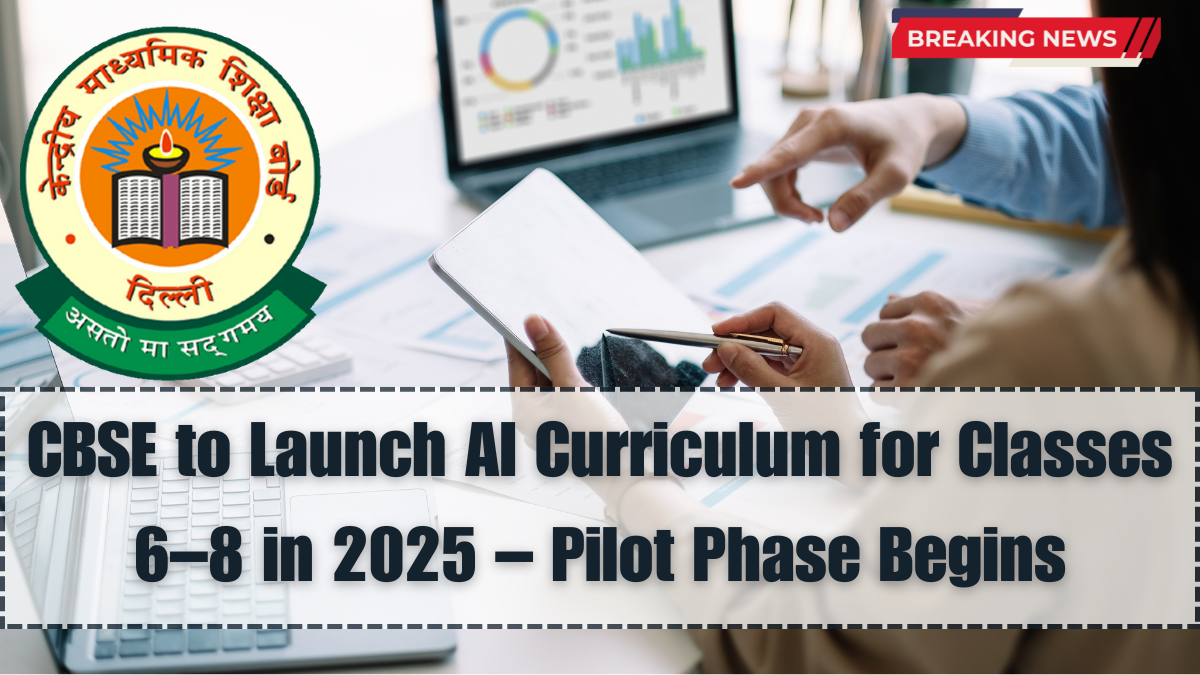The CBSE AI Curriculum 2025 has officially been launched for Classes 6 to 8 across select schools as part of the Central Board of Secondary Education’s digital education push. This marks a significant step in integrating AI education India with the mainstream school curriculum, making CBSE the first board to adopt structured AI and coding in schools at the foundational level.
The pilot phase of the curriculum is already underway in top CBSE-affiliated schools. It is expected to expand across more schools in the coming academic cycle under the CBSE 2025 digital strategy. The goal is to prepare students for future-ready careers by giving them early exposure to emerging technologies.

What’s Included in the CBSE AI Curriculum 2025?
The CBSE AI Curriculum 2025 is designed to be activity-based and age-appropriate, promoting hands-on learning. Core elements of the program include:
-
Foundations of Artificial Intelligence
-
Problem-solving with coding logic
-
AI in real life: voice assistants, robotics, automation
-
Machine learning basics through visual simulations
-
Creative thinking and ethical AI practices
The school coding modules have been built in collaboration with leading EdTech firms, academic researchers, and industry professionals.
Classes and Subjects Covered Under the New Curriculum
The AI curriculum is now being offered as part of the co-scholastic subject framework for middle school students. Here’s a breakdown of how it is structured:
| Class | Subject Type | Hours/Week | Evaluation Type |
|---|---|---|---|
| 6 | Co-scholastic module | 1–2 hours | Project + Oral |
| 7 | Skill subject option | 2 hours | Portfolio-based |
| 8 | Skill subject option | 2–3 hours | Practical + Viva |
This curriculum under CBSE 2025 encourages students to explore AI applications through real-world projects.
Benefits of Learning AI in Middle School
The CBSE AI Curriculum 2025 aims to foster early technological curiosity and readiness. Key benefits include:
-
Better logical reasoning and problem-solving
-
Increased digital awareness at an early age
-
Enhanced interest in STEM and future technologies
-
Hands-on coding in schools with AI-powered tools
-
Improved adaptability for future job markets
The pilot initiative is receiving positive feedback from educators and students alike, reinforcing CBSE’s leadership in future-forward AI education India.
How Schools Are Implementing the AI Curriculum
Schools involved in the pilot phase of the CBSE AI Curriculum 2025 are taking the following steps:
-
Conducting teacher training workshops with certified AI mentors
-
Setting up AI labs and digital smart rooms for practical learning
-
Holding inter-school AI exhibitions and project competitions
-
Including AI topics in internal assessments and term activities
-
Collaborating with tech companies for interactive teaching tools
The initiative falls under the broader CBSE 2025 reforms to build an inclusive, innovation-driven learning ecosystem.
FAQs
What is CBSE AI Curriculum 2025?
CBSE AI Curriculum 2025 is a structured program introduced by CBSE for Classes 6–8, focusing on Artificial Intelligence, coding, and real-world applications.
Is the curriculum available in all CBSE schools?
Currently, it is being piloted in select CBSE-affiliated schools. Full-scale rollout is expected in phases under the CBSE 2025 plan.
What are students learning under this AI curriculum?
Students are learning about the basics of AI, machine learning, ethics in technology, real-life use cases, and basic coding in schools.
How will the AI subject be assessed?
Assessments will be based on project work, group activities, portfolios, and practical application rather than written exams.
Will AI be a compulsory subject?
No, AI education India is being introduced as an optional skill subject or co-scholastic module for middle school students under the CBSE AI Curriculum 2025.
Click here to know more.
